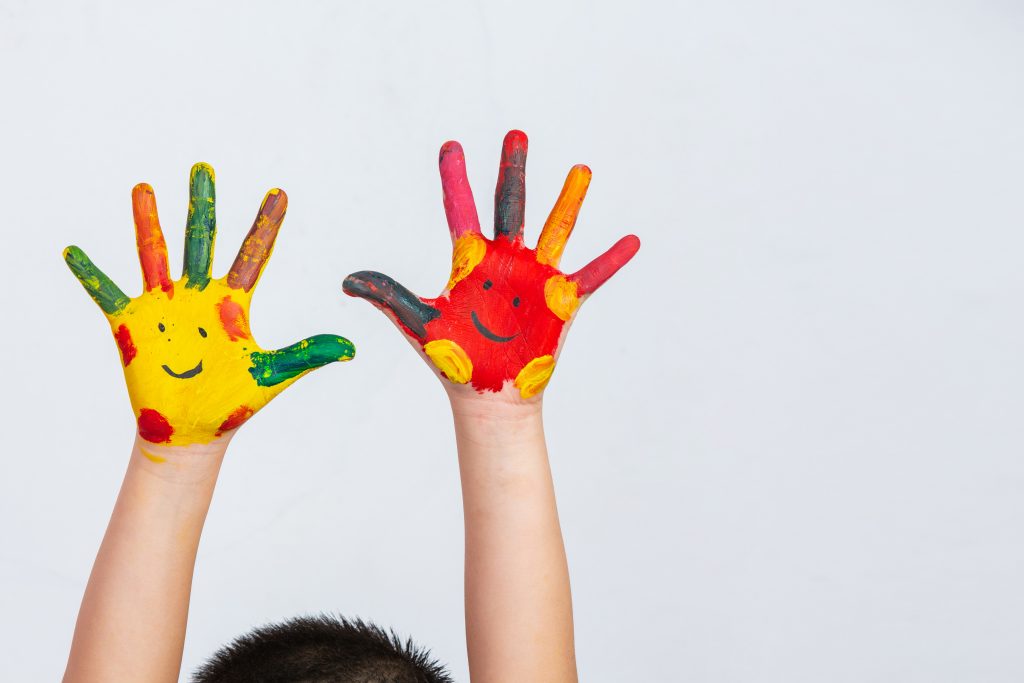
Pre-primary
Mrs G Haux
Head of Pre-primary
Celebration! This is how Term 3 started at Pre-primary: Excited children with shining eyes and smiles hidden behind masks were socially distanced into classrooms with balloons, bunting, cupcakes and spaciously rearranged furniture and toys.
Although the learners attend pre-school on alternate days, the hours are filled with a variety of activities which have been adapted to the ‘new- normal’.
“In extraordinary times like these, taking a gentle approach to schooling, will help our children to survive the stress of it all, as well as ourselves.”
“In extraordinary times like these, taking a gentle approach to schooling will help our children to survive the stress of it all, as well as ourselves,” is wise advice from a home schooling mother of eight (Se7en).
We are so thankful to have the lively little children back at preschool and we trust the Lord for His safe keeping.

Foundation Phase
Mrs L Stegen
Head of Foundation Phase
What a delight it is to have our children back at school! Their joy and ability to accept different circumstances have given the teachers much to be thankful for.
The present circumstances are an opportunity for teachers and parents to teach children responsibility and ownership of the learning experience. More than usual is expected of parents and children lately and parents can demonstrate by example. Children should be assisted to maintain a daily routine with regards mealtimes, bedtimes, playtimes and school times. They should have a specified place which is quiet where they do their schoolwork without distractions. They should be helped to set goals and enabled to take responsibility for their work.
It all starts with little things which can prepare children for greater responsibilities in the future. A child who learns responsibility will not make excuses and blame others for circumstances or their own failures. A responsible child experiences the joy of knowing that others can depend on what they do and say.
Of course, encouragement and praise have a place in teaching responsibility. As someone once said, “Children become the ones we tell them they are.” Encouragement and praise for demonstrating responsibility can help them reach their full potential.
Children become the ones we tell them they are.

Intermediate Phase
Mrs E Gouws
Head of Intermediate Phase
Teachers always start where kids are, and this is where we started this term. What children have learned in the past 8½ weeks is probably more than they would have learned had they been at school. According to Kimberley Moran from We Are Teachers, the COVID-19 crisis has helped them “…learn to ask for help, be flexible, connect to people in different ways and learn to problem-solve.” Teachers aim to teach these skills at school, but many children have learnt these social-emotional skills during lockdown.
The Covid-19 crisis has helped them to learn to ask for help, be flexible, connect to people in different ways and learn to problem-solve.
Kimberley Moran
Online schooling or remote learning has changed the usual way of learning but for sure, children have been learning. Reading a book in a sunny spot is just as good for language skills and literacy as completing a comprehension. When an activity is fun, children are learning. One of the finest things to come out of this time is the availability of audio and e-books. Children love listening to stories. The Listen English Story App which can be downloaded from Google Play Store on your phone offers a large number of well-known stories such as Brothers Grimm, Pinocchio, Sherlock Holmes and many others. The audio stories are well read, and they will give your child endless listening pleasure. The LibriVox App downloaded from the same platform, offers a delightful set of animal stories written by Thornton W. Burgess such as The Adventures of Jimmy Skunk, The Adventures of Paddy Beaver, The Adventures of Buster Bear and others.
“Reading books every single day increases knowledge exponentially,” says Kimberley Moran.
When children do not have access to books every day, audio books can keep them interested in books and learning too.
Reference https://www.weareteachers.com/kids-arent-falling-behind/

Senior Phase
Mr D van Straten
Head of Senior Phase
According to a recent study by Microsoft, researchers found that attention spans have decreased by an incredible 4 seconds, from 12 to 8 seconds, between 2000 and 2015. According to the writers, “This drop has largely been blamed on the nature of technology and the constant stimulation it offers viewers.”
Since COVID-19 has most likely contributed to the worsening of this trend by exposing many children to more screen time than ever, parents and teachers would do well to take note of such statistics. We should ask ourselves these questions: How often must I repeat instructions to my child or the learners in my class? How often does my child forget what homework was assigned? How long does it take my child to complete the homework?
The Internet provides ways to improve the attention spans of children. Although many ideas are obviously unacceptable, some could be useful: practising attentive behaviour, eliminating distractions and breaking tasks into smaller chunks, limiting computer games and encouraging board games such as chess.
The most precious gift you can give someone is the gift of your time and attention.
Nicky Gumbel
Bringing the challenge closer home: When a child speaks to me during the rush of the day, what is my attention span like? How often do I give the child my full attention and listen in such a way that the child feels that s/he has been heard?
In the words of Nicky Gumbel, “The most precious gift you can give someone is the gift of your time and attention”.

FET Phase
Mrs A du Preez
Head of FET Phase
Die mooiste ding vir my
“In hierdie opstel skryf ek oor iets wat baie mooi is vir my. Vir die eerste keer het ek gesien hoedat ’n wit man vir ‘n ander wit man vertaal van Zulu na Engels.
Dit was en dit is die mooiste ding waaraan ek ooit kon gedink het, want nou hoor ek ’n wit man wat in Zulu preek en sê: “Love your neighbour as yourself”.
An extract from a Grade 10 essay written by Lithelani Mbambane
While marking one Afrikaans descriptive essay after the other and sharing with each pupil the ‘’beauties of the earth’’, I stumbled on this one. It brought me to a standstill. It made me think… In this young lad’s eyes, the most beautiful thing he saw, was not just one white man speaking fluent isiZulu, he saw the beauty of love.
Speaking a different language means more than the words – it demonstrates a care that washes away barriers and reaches hearts.
The opportunities afforded South Africans is one of our hidden treasures. There is power in speaking another’s language; gogo, tannie, mfundisi, and so it continues. The more languages we can learn, the more keys we have to peoples’ hearts.
If you are still able to learn a new language, do so. According to studies done in Sweden, learning a language, causes areas of the brain associated with memory, to increase in size. Like any muscle in the body, regularly exercising your brain can make it stronger and more flexible – who doesn’t need that? Your only question should be, which language shall I start with. And then begin.
It is no wonder that God sent tongues with Pentecost: “…Cretans and Arabians – we hear them telling in our own tongues the mighty works of God” (Acts 2:11).

Academics
Mrs H Pretorius
Head of Academics
Recent articles in newspapers from across the globe reported views about the impact of a pandemic, such as COVID-19, on the mental and emotional well-being of children.
One such article was written by two doctors who are both professors of paediatrics in the USA, Leonardo Trasande and Bernard Dreyer. The article is headlined “The pandemic will haunt today’s children forever. But we can help them now”.
While the authors mention the results of interesting scientific research in their article, my attention was drawn by these two thoughts:
“Families can help, even while they are staying at home. Remember that children will observe adult behaviours and emotions for cues on managing their own emotions.”
“The capacity of the next generation to manage other disasters depends very much on our children rising from the challenges we face now and not simply surviving but thriving and developing into their fullest potential.”
It was a timely reminder to me that we have to guide our children to become emotionally strong and resilient. They must be equipped to face their unique challenges as soon-to-be adults, and then to make a positive contribution in their respective communities.
School work can be an integral part of this process. Routine and a safe place in which to work help to provide a framework for a happy childhood experience.
In spite of Corona and all the disturbing news we hear each day, we can empower our children to do their bit (wear masks, sanitise and keep a social distance) so that they will not feel helpless. At the same time we should not underestimate the harmful emotional effects on children who listen in to adult conversations about topics that are too distressing for them to bear. Let us ensure that we spend quality Corona-free time with our children and demonstrate to them the joy that each person can have in living life as God meant it to be.
